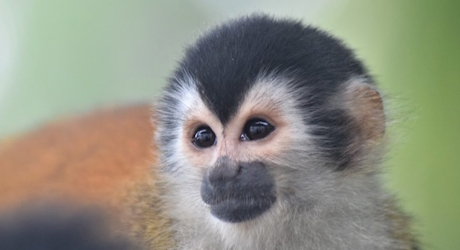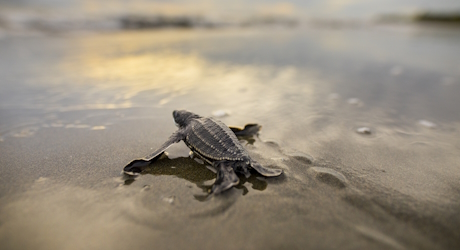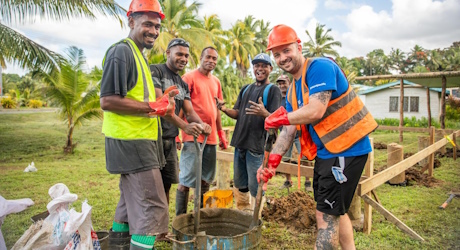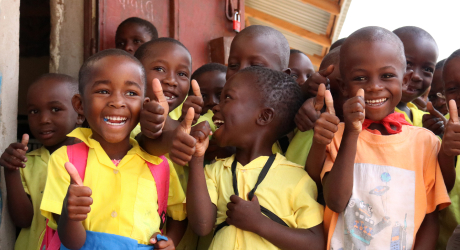Footprints Project
Since 2005, travelers like you have helped us change the world through micro-donations.
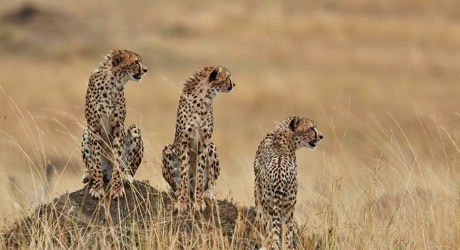
-
A total of
8863
Travelers
-
donated
$20002.1
(100% funded) -
to help improve
Environment
-
impacting
7000
people -
in
Botswana
Project background
The cheetah is Africa’s most threatened large cat. The recent census by the IUCN has estimated the global cheetah population at approximately 7000 individuals, clearly demonstrating Botswana as one of the last strongholds of the species with 30% of the world’s population.
However, Botswana’s cheetahs are under threat. From an ecological perspective, agricultural farmlands serve as critical habitat for cheetahs in Botswana as they tend to be unable to compete in formal protected areas that hold higher densities of larger carnivore species. Nearly 80% of cheetahs are estimated to live outside reserves on unprotected lands, where they come into conflict with livestock farmers. However, such areas are becoming increasingly overgrazed and poorly managed. Livestock production is not effective, carnivore conflict is high, and wildlife populations continue to decline.
Currently, human-wildlife conflict is the greatest threat to Kalahari carnivores, especially the cheetah and wild dog populations. To stop wildlife decline, changes must be made to the current methods of land and livestock management. Although many farmers harbor negative attitudes towards carnivores in general, there is concurrent realization that wildlife is a national resource for tourism, and therefore farmers are becoming more interested in techniques that minimize conflict and enable coexistence.
Key project activities and results
The USD 20,000 raised by The Footprints Network for this project was used for the following activities:
Farmer training workshops
Three farmer training workshops were held reaching 143 farmers in Bere, Kacgae (September 2019) and Ghanzi (February 2020). These workshops increase the capacity of farmers to identify different carnivores and implement relevant methods to reduce livestock losses. Presentations and demonstrations are provided on relevant subjects that assist in improving livestock management for reduced carnivore conflict and optimized production. These include:
- Assessing livestock losses
- Livestock husbandry
- Conflict mitigation methods
- Training and care of livestock guarding dogs
- Record keeping
- Rangeland management and disease management
- Dry-season fodder production to mitigate against drought.
The workshops were also attended by key government departments, including:
- Wildlife and National Parks
- Forestry and Range Resources
- Veterinary Services
- Animal Production
- Youth and Agricultural Business Promotion.
Livestock Guarding Dog (LGD) placements
- Three groups of LGDs were placed from July 2019 to date. These were done in July (9 puppies), November (6 puppies) and March (10 puppies) totaling 25 dogs over the project period.
- LGD puppies spend 3 months at the CCB demonstration farm going through their initial training. During which, close monitoring is done to make sure that all the puppies develop well to become effective LGDs before they are distributed to their new homes.
- CCB provides veterinary support including vaccinations and sterilization before placement. The recipient farmers are trained how to monitor and care for their LGDs and monthly health checks are conducted to monitor the status of individual LGDs post placement.
- Ongoing monitoring of livestock guarding dog care and performance is a continuous process. Currently there are 64 active dogs active in our primary focal area of the Western Kalahari. Over the project period, 3 LGDs died due to snake bites and poisoning. However the farmers were able to replace these by training their own dogs.
- The monitoring database is currently being analysed for the production of a peer-reviewed scientific paper. Initial results have clearly demonstrated a reduction in conflict and improvement in carnivore tolerance through utilising LGDs with an average reduction in livestock losses of 78% compared to before placement.
- As well as direct LGD placements, CCB provides guidelines on how to train and care for an LGD and provides technical support for farmers as required.
- It is estimated that each dog will potentially protect its herd from approximately 30 cheetahs during its expected average lifetime.
Farmers’ network and exchange visits
- Members of the Southern Livestock Farmers Network (SOLIFANE) embarked on an exchange visit to Ghanzi from 25th to 26th of July 2019. The purpose of the visit was to experience and be part of the 2019 Ghanzi Agricultural show. The 18 member team was then taken on a benchmarking visit to one of our model farmers, Mr. Thaushe, a renowned small stock and cattle farmer in the communal farming area. After receiving training on fodder production through CCB, Mr. Thaushe started a fodder garden and production of molasses blocks. This enables him to produce supplementary feeds for his livestock and enables better management. The visiting farmers experienced a range of methods during the visit and were inspired by their peer to take up some of these approaches at their own cattleposts. Peer-to-peer learning is an effective way of information sharing and encouraging best practices.
- On the 7th of September 2019, 11 members of the Ghanzi Farmers Network took part in the Holistic Land Management training held at Oasis Farms in Ghanzi. The workshop was attended by 52 farmers from the area and various government departments. The training was aimed at supporting farmers with skills and tools that help in managing their environment, improving their livelihoods and ensuring that their lands are utilised sustainably and maintain their productivity.
Model farmers and community demonstration farms
- The CCB demonstration farm is used to conduct farmer training workshops and provides a practical demonstration of a working model for conflict management.
- Members of the Ghanzi Farmers’ Network were selected as demonstration farmers in their respective areas. 4 farmers were selected based on their potential to execute various livestock management practices in order to maximize their livestock production and demonstrate this to others. The farmers agreed to become model farmers to train their communities through exchange visits and presenting at workshops. In addition, they have agreed to act as hosts for LGD puppy training to increase the number of LGDs available for placement and to demonstrate the technique to community members.
- The selected model farmers were assisted to improve their livestock kraals (enclosures). CCB provided the fencing materials required and the farmers covered the costs for construction as a way of contributing to the project.
Farmer testimonials
Mr. Mister Phakalane - Farmers Network Member and LGD recipient
“Ke leboga (Thank you) CCB for this dog. After receiving a dog from you I experienced decreased predation on my farm. Touch, my dog has helped me to stop cheetahs and jackals from tormenting my goats. It is very amazing to see how a dog can do this wonderful job. The benefits of using a livestock guarding dog include a decrease or elimination of predation, reduced labour like human herding of animals every day, reduced reliance on other predator control techniques, and greater peace of mind. I appreciate what CCB has done for me. Thank you very much. Keep up the good work!”
Ms. Neo Motseothata - Farmers Network Member and LGD recipient
“Before meeting CCB, the normal practice I knew was that you kill cheetahs and carnivores whenever livestock is lost. Ever since attending a farmers’ workshop I have been more tolerant of wildlife than ever. CCB intervened by letting us know how to respond to conflict and through them placing a livestock guarding dog with my small stock, I can satisfactorily say I have never experienced any conflict. This should encourage us even more to work together and coexist”.
Ms. Puisano Mosimanewakgang - Farmers Network Member and LGD recipient
“I got to know CCB through attending a farmers’ workshop. I had 10 goats plus a ram. It was my only livelihood but the number dropped to 5 due to carnivores in the area. After receiving an LGD from CCB, the number of my livestock has increased and twice a year I sell the excess numbers to make my own income. I look after my children alone and this has helped me to support them. After CCB’s assistance, we are now well aware of wildlife in our area and are coexisting peacefully with them”.
Mr. Kereeope Junior Dinko - Farmers Network Member and LGD recipient
“I am farmer who has struggled before to live with prevailing carnivores in my farm, because they terrorised and killed my goats. One day at the beginning of the year, I met two gentlemen from CCB. They told me how they train dogs to be good shepherds. I was interested in having one, so they gave me one female puppy and I put it in my flock of goats. The dog is now over 1 year old and since the day they gave it to me my goats are well herded by this dog. I have never lost any goat due to carnivores like before. I love this dog, I take good care of it because it is doing a good job for me. I am very happy and I can testify that guarding dogs are very good indeed and I agree that coexistence of livestock farmers and wildlife is possible. I am not only saying this to promote you CCB, I am also saying this out of happiness, good experiences and the wonderful changes which were brought by this dog. Thank you so much for giving me the dog. I encourage other farmers with carnivore problems to have dogs to protect their livestock and help conserve our wildlife’’.
What next?
CCB is a long term conservation organisation and is committed to this approach beyond the duration of the grant. As the project develops various approaches are increasingly adopted by the community ensuring long term sustainability. However, where required, CCB will seek additional funding to support the long term goals of human wildlife coexistence and sustainable livelihoods in this important region, ensuring that the area remains a haven for cheetahs and other globally threatened carnivores.
In the longer term, better farm management will assist in improving livestock production and range health, which will in turn assist with improving ecological diversity on farmlands and supporting more secure livelihoods for communities living with wildlife.
Our next steps include continuing our successful Farming for Conservation program through farmer training, farmers’ networks for peer-to-peer learning, livestock guarding dog placements, model farmers and demonstration farms. Our Conservation Research program will be monitoring cheetahs and wildlife populations in the Western Kalahari and our Engagement and Awareness program will be inspiring the youth and the general public on the importance of carnivores and environmental conservation. As well as these ongoing programs, we are launching a new Communities for Conservation program, which partners with communities to develop alternative livelihoods such as ecotourism, veld product harvesting and craft production. These livelihood approaches have potential to improve the benefits from wildlife and natural resources and harness the indigenous knowledge of the unique cultures in the region. With increased benefits from wildlife, communities can see a direct value from living alongside cheetahs and other carnivores and will be motivated to become involved in their conservation, enabling human wildlife coexistence in the Western Kalahari.
Can I visit this project?
Yes. We are located 4 hours from Maun (the gateway to the Okavango Delta) and into the Western Kalahari. We look forward to a visit!
Traveling soon? When you buy travel insurance with us, you can make a contribution towards a cause you care about.
Get a quote